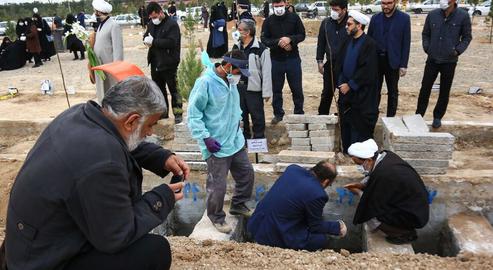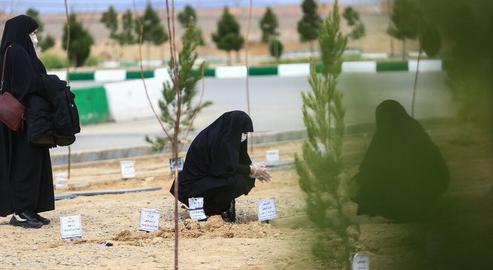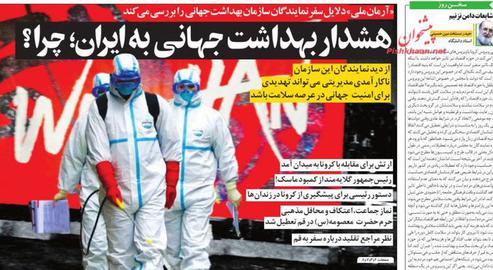“I heard they went to the cemetery at midnight, dug up the grave and exhumed the body. They said that their father was a Muslim and prayed regularly but he had not been buried in the Muslim way: no ablution, and no prayers for the dead.”
The man speaks with a Mashhad accent, and punctuates his sentences with an appeal to the Shia saint Imam Reza, who is buried in Mashhad. “From February 20, when the coronavirus outbreak was officially announced, the Health Network ordered health workers to teach the villagers about the disease,” he says. “My colleagues and I went to the villages we were covering and told them about the symptoms face to face. We told all of them to take it seriously if they had a fever, dry cough or shortness of breath.”
The group were busy telling villagers about coronavirus when the very first patient suffering from shortness of breath was brought to their attention. “He was an old villager who had asthma,” the health worker says. “His family thought that it was an asthma attack but an asthma inhaler did nothing for him, and they said that he had been coughing for days.”
They took the man to Imam Hasan Hospital in the city of Bojnourd, but he died before any test results came back from Tehran. His body was turned over to the family and he was buried in the village in the traditional way.
But according to this health worker, three other villagers with coronavirus symptoms then died in the same village. Their test results had not come back either, but they instead were buried according to the protocols for burying coronavirus cases. The team brought the bodies to the village in an ambulance and two workers in protective gear buried them at a distance from other graves. They also told families to pray at a distance.
Now, he says, he has been told that in another village in the same area, a family has exhumed the body of their loved one so that they can rebury the deceased according to strict Islamic rites: “Villagers have a stronger belief in traditions and religion, so it was very difficult for them to accept this kind of burial," the health worker says. But, he adds: "I heard that all seven members of the family who opened the grave have been arrested.”
From the very beginning of the outbreak, the burial of coronavirus victims has posed a challenge for both religious authorities and their followers. Under international health guidelines, these victims' bodies are not washed before burial but a number of authorities took issue with eliminating ablution outright. The Supreme Leader Ayatollah Ali Khamenei and his former teacher Grand Ayatollah Musa Shubairi Zanjani have now both said ablution must be performed, as long as the rules of good hygiene are observed.
Both, however, have added that if this is judged to be dangerous, people can choose to perform tayammum or “dry ablution”: the washer puts their hands on a clean patch of the ground, rubs both hands together to make sure that no soil remains and then touches the body following a prayer ritual. In the circumstances, both ayatollahs have said that if necessary, the person performing the ablution need not actually touch the body and performing the ritual is sufficient in itself.
Seminary Students Volunteer
In the past few weeks it has been widely reported that seminary students are volunteering to perform burial rituals for coronavirus victims. “One of our relatives went to his creator because of coronavirus,” a seminary student who these days works at the morgue of Behesht Masoumeh Cemetery in Qom tells IranWire. “At the time there was still no talk of seminary students joining the jihad for performing the ablution of those who die of coronavirus. These poor people were trying everything to have the body delivered so that they could perform ablution themselves. They had heard that ablution was not performed on the bodies of coronavirus victims and, because they poured lime on the body, they would not put a lehad stone there.”
According to Shia tradition, a lehad stone is a stone placed over the head of the deceased in the grave because the deceased is not aware that they are dead and might wish to get out. On starting to get up, the belief holds, their head will hit the stone and they will recognize that they are dead.
“I noticed ads on seminary students’ Telegram channels for people to perform ablutions on coronavirus victims,” says this 22-year-old student. “My mind was preoccupied by this family who were worried about the burial of their loved one according to sharia law, so I went to work.”
An infectious disease specialist at Isfahan’s Amin Hospital tells a similar story. “When one infected patient died, his family came and pleaded with me not to cite coronavirus as the cause of death so that they themselves could take care of it,” he says. He goes on to explain in Isfahan, the bodies of coronavirus victims are not handed over to the families but are sent directly to the cemetery for burial and only three to five members of the family are permitted to watch at a distance. When he asked the family why they wanted to do this, he says, he was told that: "Our father was very religious but now they want to bury him without ablution and without a shroud.”
“The deceased's daughter, who was very religiously-attired, told me things about placing lehad stone that I could not understand," the doctor recalls. “They were thinking more about religious rites and traditions than about people's safety, or even themselves. I cannot understand this when my patients are struggling to breathe."
In early March, an informed source told Iran IranWire that in many cities the bodies of coronavirus victims had been handed over to their families. “The cause of death cited in many death certificates has been things like ‘severe breathing disorder’, lung failure or even heart attack or influenza,” they said. “The bodies were handed over to the families and they buried them according to Shia tradition.”
Chief Justice Agrees With Hiding the Cause of Death
IranWire has learned that Iran's head of judiciary, Ebrahim Raeesi ,also believes that citing a cause of death other than coronavirus is necessary [Persian link].
A source told IranWire complying with families' wishes to misrepresent the cause of death is not unusual. “When the Revolutionary Guards’ Intelligence Unit is trying to hide the figures for fatalities and pressure medical staff to cite other causes of death, they do not strongly resist such requests from families,” they said.But it goes further: the family of one coronavirus victim has told IranWire that they were actively threatened: they would not get the body if they said anything about coronavirus [Persian links].
But the seminary student who spoke with IranWire believes people have been less worried religious burials of coronavirus victims since seminary students became involved. “We do everything according to sharia law,” he says. “During the burial we recite prayers for them, we do the ablution or tayammum and after covering the body with lime we even place a lehad stone.” According to him, in the beginning the students solely used tayammum but in the past few days they have also been able to use water for ablution. On Monday, April 6, Fars News Agency also confirmed that water for ablution has been made available for the burial of coronavirus victims in Tehran, in the name of “creating unity in the country for a maximal implementation of the fatwa by the exalted Supreme Leader.”
The deployment of seminary students at morgues, of course, was not only in consideration of sharia law. According to a contractor for burials at Behesht Zahra Cemetery in Tehran, the site has had to deal with a severe shortage in the burial workforce. "The first reason was that the number of deaths had jumped because of coronavirus," he said. "The second reason was that several gravediggers and morgue workers were themselves infected and died, either because of the cover-ups, or because they were not careful or misinformed. Some of them were experienced, and now we have a severe shortage of manpower for burials.”
The problem has hampered the functioning of other cemeteries as well, he added. “I have heard that in Qom’s Behesht Masoumeh and in Mashhahd’s Behesht Reza, many of the burial workers have died of coronavirus,” he says. A short video about seminary students who work in morgues in Mashhad also mentions the death of a one student infected with coronavirus after he performed ablutions.
Do-It-Yourself Burials
The same contractor also reports that problem of religious burials in big cities has now been largely resolved because of the volunteer seminary students. But the problem persists in villages and in smaller towns. One of his relatives in the city of Abyek in Qazvin province recently died and, he says, “They gave the family full control over the burial. They only gave them a few bags of lime to cover the body with. They advised them not to hold a public ceremony and to perform the prayer for the dead at a distance from the grave. The family had to find people for ablution and burial themselves. They paid for their own protective gear and equipment.”
Mohammad Hossein Nazari, a documentary filmmaker from Khorramabad in Lorestan province, has a similar story about the burial of his mother in March: a story he narrated in a series of heart-rending tweets.The family themselves carried the body from the hospital morgue, placed it in the ambulance, removed it from the ambulance, carried it to the ablution chamber, gave the burial workers the protective gear they had bought for them, placed the body of their mother into the grave themselves and finally spread lime over the body: all without any protection.
“I did not pull aside the shroud from my mother’s face,” he wrote in one of the posts. “What child can pour lime over his mother’s face? What a stab in the heart! Why we were the ones who had to do it?... Burial rites among the Lors [an ethnic group in Iran] is hell. Anybody who has seen it will understand the hell we were in.”
Related Coverage:
IranWire Reports on Coronavirus Outbreak in Iran
Lies, Misinformation and Makeshift Graves: a Chronology of Coronavirus in Iran
visit the accountability section
In this section of Iran Wire, you can contact the officials and launch your campaign for various problems


























comments